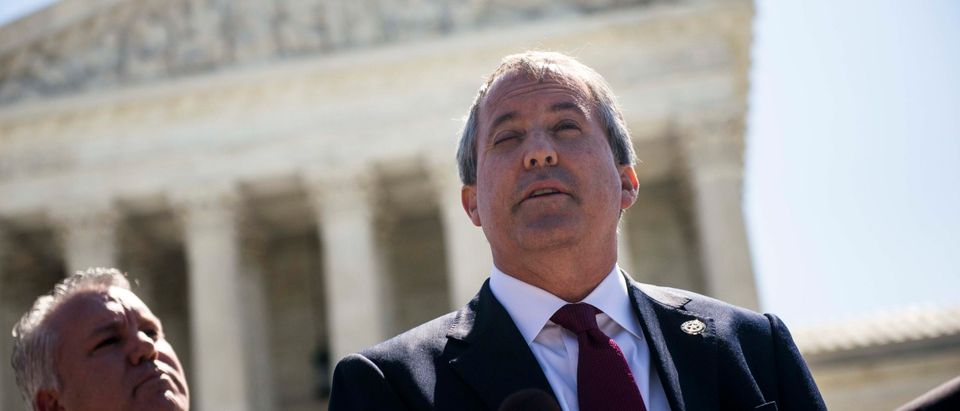Republican Texas Attorney General Ken Paxton filed a suit in the Supreme Court Tuesday against Georgia, Pennsylvania, Michigan and Wisconsin over their administration of the presidential election.
“Our Country stands at an important crossroads,” the suit reads. “Either the Constitution matters and must be followed, even when some officials consider it inconvenient or out of date, or it is simply a piece of parchment on display at the National Archives. We ask the Court to choose the former.”
“A dark cloud hangs over the 2020 Presidential election.”
Paxton argues that pandemic-era changes to election procedures violated federal law and is asking the Supreme Court to block the states from voting in the Electoral College.
“These flaws cumulatively preclude knowing who legitimately won the 2020 election and threaten to cloud all future elections,” the suit alleges.
“Using the COVID-19 pandemic as a justification, government officials in the defendant states of Georgia, Michigan and Wisconsin, and the Commonwealth of Pennsylvania, usurped their legislatures’ authority and unconstitutionally revised their state’s election statutes.”
Paxton says the states used executive orders to change the election process and hurt voting integrity by not “protecting” signature verification and witness requirements. The suit alleges the states failed to segregate ballots that would allow an “accurate analysis to determine which ballots were cast in conformity with the legislatively set rules and which were not.”
Under the guise that Pennsylvania Secretary of State Kathy Boockvar would order county officials to segregate the ballots received late, the Supreme Court refused to expedite Pennsylvania Republicans’ challenge to a state Supreme Court order that allowed ballots received up to three days after the election to be counted as valid even if they lacked a postmark in October.
Boockvar originally complied, issuing guidance on Oct. 28 ordering all ballots received after Nov. 3 to be kept separate in case the Supreme Court ruled the extension unconstitutional.
Boockvar updated the guidance last minute on Nov. 1, ordering all ballots that arrived before Nov. 6 to be counted.
Supreme Court Justice Samuel Alito ordered on Nov. 6 that all late ballots must be segregated despite Boockvar’s guidance.
Georgia Deputy Secretary of State Jordan Fuchs dismissed the allegations, according to The Texas Tribune. (RELATED: Arizona GOP Encourages Constituents To Give Their ‘Lives’ Over Trump’s Election Dispute)
“The allegations in the lawsuit are false and irresponsible,” Fuchs said. “Texas alleges that there are 80,000 forged signatures on absentee ballots in Georgia, but they don’t bring forward a single person who this happened to. That’s because it didn’t happen.”
Georgia Deputy Secretary of State Jordan Fuchs on the Texas lawsuit: “The allegations in the lawsuit are false and irresponsible … they don’t bring forward a single person who this happened to. That’s because it didn’t happen.”
— Kyle Griffin (@kylegriffin1) December 8, 2020
Michigan Attorney General Dana Nessel called the suit a “publicity stunt.”
.@MIAttyGen @dananessel issued the following statement in response to the lawsuit filed by Texas Attorney General Ken Paxton seeking to overturn election results in Michigan and other states: pic.twitter.com/62Y4SLpiis
— Michigan Attorney General Dana Nessel (@MIAttyGen) December 8, 2020
“The motion filed by the Texas Attorney General is a publicity stunt, not a serious legal pleading. The erosion of confidence inner democratic system isn’t attributable to the good people of Michigan, Wisconsin, Georgia or Pennsylvania, but rather to partisan officials, like Mr. Paxton, who place loyalty to a person over loyalty to their country,” a statement posted to Twitter read.


